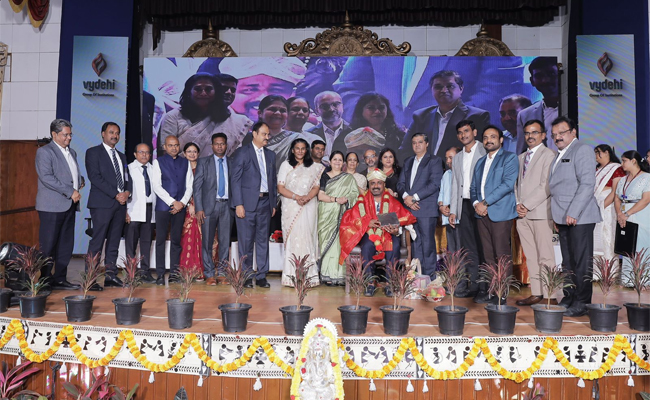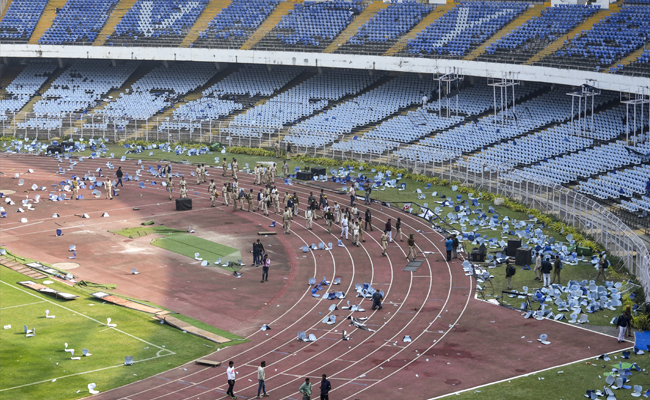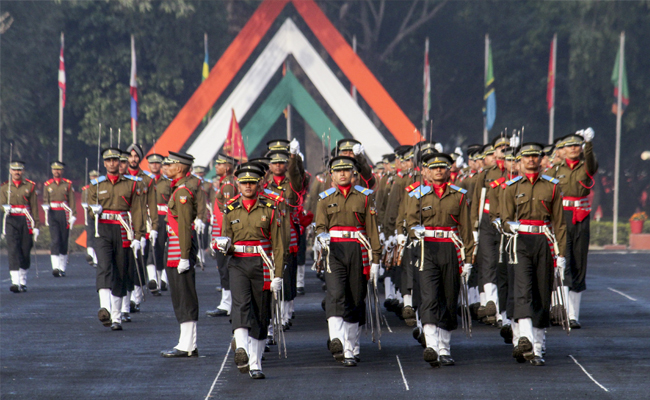Bengaluru: The Karnataka State Allied and Health Care Council, led by Dr. U T Ifthikar Fareed, organised a “Meet & Greet” event featuring Dr. Yagna Unmesh Shukla, Chairperson of the National Commission for Allied and Health Care Profession, Ministry of Health & Family Welfare, Government of India. The programme took place at the Sai Keshava Auditorium, Vydehi Institute of Medical Sciences.
The event saw participation from principals, faculty members, clinicians, and students of Allied Health and Physiotherapy Colleges from Bengaluru, Mangalore, Mysore, and North Karnataka. Dignitaries in attendance included Dr. Sujatha Rathod, Director of Medical Education; Dr. D A Kalpaja, Chairperson of the Vydehi Group of Institutions; Dr. Riyaz Basha, Registrar Evaluation at Rajiv Gandhi University of Health Sciences; and other notable figures from various institutions.
A significant highlight of the programme was the launch of the Karnataka State Allied & Health Care Council logo by Dr. Yagna Unmesh Shukla. The event also featured the grand felicitation of Dr. Shukla, Dr. Kalpaja, and Dr. U T Ifthikar Fareed for their contributions to the field.
Dr. Yagna Shukla provided insights into the council's regulations and their upcoming implementation on 29 October, which will be inaugurated by the Prime Minister. The event was well-attended, with approximately 1,200 delegates participating.







Let the Truth be known. If you read VB and like VB, please be a VB Supporter and Help us deliver the Truth to one and all.
New Delhi (PTI): Police here have busted a crime syndicate involved in traffic fraud and extortion, arresting three people including the alleged mastermind who sold fake stickers to help commercial vehicles bypass no-entry restrictions, an official said on Saturday.
The police said they dismantled a third organised syndicate linked to traffic-related frauds, with the arrest of Rinku Rana alias Bhushan, his associate Sonu Sharma and Mukesh Kumar alias Pakodi, who was also connected to another extortion syndicate.
According to the police, Rinku Rana was running a well-organised network that facilitated the movement of commercial goods vehicles during restricted hours by selling fake 'marka' or stickers for Rs 2,000 to Rs 5,000 per vehicle every month. The stickers were falsely projected as authorisation to evade traffic challans.
During raids, the police recovered Rs 31 lakh in cash, property documents worth several crores of rupees, over 500 fake stickers and six mobile phones allegedly used to operate the syndicate.
The crackdown followed a complaint filed by a traffic police officer in April this year after a commercial vehicle tried to evade checking by producing a fake sticker claiming exemption from enforcement action.
Investigation revealed that social media groups were being used to coordinate the illegal movement of vehicles and alert drivers about traffic police checkpoints, police said.
"A parallel system was being run to cheat drivers and vehicle owners while undermining traffic enforcement. On the basis of evidence, provisions related to organised crime under the BNS were invoked," a senior police officer said.
Sonu Sharma, the police said, managed social media groups through which stickers were sold and real-time alerts were circulated regarding traffic police movement. He also acted as a link between Rana and drivers operating in the field.
In a related development, Mukesh Kumar alias Pakodi, an associate of Rajkumar alias Raju Meena, who was earlier arrested under the Maharashtra Control of Organised Crime Act (MCOCA), was also apprehended.
Mukesh allegedly helped extort money from transporters and was involved in blackmailing traffic police personnel by recording enforcement actions, the police said.
Investigators alleged the syndicate led by Rajkumar deployed drivers to deliberately violate traffic rules and secretly record police officials during challans, later using manipulated videos to extort money under threat of false allegations.
The police said that in total, eight accused belonging to three different organised crime syndicates linked to traffic frauds and extortion have been arrested so far.
Further investigation is underway to trace the remaining members, conduct financial probes, and analyse digital evidence recovered during the raids, officials added.





